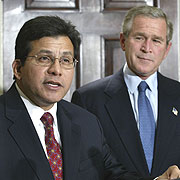Above the Law
Federal Intelligence Surveillance Act
SUBCHAPTER I—ELECTRONIC SURVEILLANCE
§ 1811. Authorization during time of war
 Attorney General Alberto Gonzales and other members of the Bush administration have been aggressively arguing that the war resolution passed by Congress in September 2001 authorizing the use of military force in Afghanistan implicitly granted the president the authority to conduct domestic surveillance without court approval.
Attorney General Alberto Gonzales and other members of the Bush administration have been aggressively arguing that the war resolution passed by Congress in September 2001 authorizing the use of military force in Afghanistan implicitly granted the president the authority to conduct domestic surveillance without court approval.
However, the Federal Intelligence Surveillance Act of 1978 (FISA), which has become an overnight superstar, explicitly addresses the issue of wartime domestic surveillance without a court order and in so doing sets a very specific limit on the president’s power. Either Gonzales believes the president is above the law, or he needs new reading glasses. Moreover, Bush’s most recent statements suggest that he would revise § 1811 to read:
On this morning’s edition of NPR’s On Point, Robert Turner, associate director of the Center for National Security Law at the University of Virginia, argued that the Founding Fathers intended to give the executive branch broad powers and an unfettered hand during times of war. We really don’t need to waste time trying to argue what the Founding Fathers intended. What matters here is the text of the 1978 law (FISA) and how the “fifteen calendar days following a declaration of war by the Congress” is to be interpreted. Turner claimed that the text is ambiguous and could be interpreted to mean that the president has discretionary authority to conduct wiretapping without a court order for up to fifteen days at any point once a war resolution has passed in Congress. Others (including myself) would argue that the text of FISA clearly states that the window granted the president to conduct such surveillance begins with a war resolution and ends exactly fifteen days after the passage of that resolution. Once that window has expired, a court order is required to conduct further domestic surveillance.
Whatever one’s reading of § 1811, I believe that the current debate needs to focus on the meaning of those words and that alone, not on what the Founding Fathers believed or intended, which is a matter of ongoing debate for historians. Ultimately, it doesn’t really matter what the Founding Fathers intended. We are not bound by their intentions. If we were, African Americans would still be in chains and counted as 3/5 of a person and women would still be disenfranchised. Certainly, the Founding Fathers never intended the Constitution to be a frozen, stagnant document. Nor did they intend for the president to become a de facto king during wartime.
What matters here are the limits that FISA sets on presidential powers to conduct domestic surveillance. Gonzales would have us believe that FISA is silent on the issue of presidential authority during times of war. He is wrong. FISA sets very specific wartime limits. If Bush has exceeded those limits, he needs to be held accountable.
Both sides agree that the War on Terror is not like other wars. It differs from other wars specifically in that it is to be waged indefinitely, in Bush’s own words, “for so long as our nation faces the continued threat of an enemy who wants to kill us.” If the War on Terror is to be waged for such a protracted period of time, we need to know exactly what the wartime limits on the executive branch are.
SUBCHAPTER I—ELECTRONIC SURVEILLANCE
§ 1811. Authorization during time of war
Notwithstanding any other law, the President, through the Attorney General, may authorize electronic surveillance without a court order under this subchapter to acquire foreign intelligence information for a period not to exceed fifteen calendar days following a declaration of war by the Congress (emphasis mine).
 Attorney General Alberto Gonzales and other members of the Bush administration have been aggressively arguing that the war resolution passed by Congress in September 2001 authorizing the use of military force in Afghanistan implicitly granted the president the authority to conduct domestic surveillance without court approval.
Attorney General Alberto Gonzales and other members of the Bush administration have been aggressively arguing that the war resolution passed by Congress in September 2001 authorizing the use of military force in Afghanistan implicitly granted the president the authority to conduct domestic surveillance without court approval.However, the Federal Intelligence Surveillance Act of 1978 (FISA), which has become an overnight superstar, explicitly addresses the issue of wartime domestic surveillance without a court order and in so doing sets a very specific limit on the president’s power. Either Gonzales believes the president is above the law, or he needs new reading glasses. Moreover, Bush’s most recent statements suggest that he would revise § 1811 to read:
Notwithstanding any other law, the President, through the Attorney General, may authorize electronic surveillance without a court order under this subchapter to acquire foreign intelligence informationfor a period not to exceed fifteen calendar days following a declaration of war by the Congress“for so long as our nation faces the continued threat of an enemy who wants to kill us” (his exact words).
On this morning’s edition of NPR’s On Point, Robert Turner, associate director of the Center for National Security Law at the University of Virginia, argued that the Founding Fathers intended to give the executive branch broad powers and an unfettered hand during times of war. We really don’t need to waste time trying to argue what the Founding Fathers intended. What matters here is the text of the 1978 law (FISA) and how the “fifteen calendar days following a declaration of war by the Congress” is to be interpreted. Turner claimed that the text is ambiguous and could be interpreted to mean that the president has discretionary authority to conduct wiretapping without a court order for up to fifteen days at any point once a war resolution has passed in Congress. Others (including myself) would argue that the text of FISA clearly states that the window granted the president to conduct such surveillance begins with a war resolution and ends exactly fifteen days after the passage of that resolution. Once that window has expired, a court order is required to conduct further domestic surveillance.
Whatever one’s reading of § 1811, I believe that the current debate needs to focus on the meaning of those words and that alone, not on what the Founding Fathers believed or intended, which is a matter of ongoing debate for historians. Ultimately, it doesn’t really matter what the Founding Fathers intended. We are not bound by their intentions. If we were, African Americans would still be in chains and counted as 3/5 of a person and women would still be disenfranchised. Certainly, the Founding Fathers never intended the Constitution to be a frozen, stagnant document. Nor did they intend for the president to become a de facto king during wartime.
What matters here are the limits that FISA sets on presidential powers to conduct domestic surveillance. Gonzales would have us believe that FISA is silent on the issue of presidential authority during times of war. He is wrong. FISA sets very specific wartime limits. If Bush has exceeded those limits, he needs to be held accountable.
Both sides agree that the War on Terror is not like other wars. It differs from other wars specifically in that it is to be waged indefinitely, in Bush’s own words, “for so long as our nation faces the continued threat of an enemy who wants to kill us.” If the War on Terror is to be waged for such a protracted period of time, we need to know exactly what the wartime limits on the executive branch are.












1 Comments:
That sucks. No doubt. But, there's something YOU can do about it. Phazers on stun. I was only a naïve 19 when I began… and fulfilled my novel with a plethora of savvy, pragmatic, avant-garde, Led-Zepplin-Christianity from a severely, head-injured-Catholic you'd most pro'bly call crazy. That’s totally cool… but, yet, who ever said YOU were sane? Touché? What you’ll come to realize in this flamboyant, indelible script is a world beyond our own which is beyond glamorous: Fulla short-stories, poetry, prayers, quotes, hardcore-heartbreaking-hilarity, aggressive conundrums, Salvador-Dali-homily, and a fantastic, buxom belief which'll help U.S. ‘rise-above’ this Finite Existence to 7th Heaven. If the TRUTH frightens you, friend, take a lookit my novel. You’ll definitely find 'King Size' solace. Out in January.
Post a Comment
<< Home